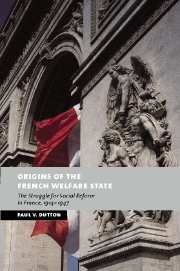Book contents
- Frontmatter
- Contents
- List of figures
- List of tables
- Acknowledgments
- List of abbreviations
- Introduction
- 1 An industrial model of family welfare
- 2 A mutual model for social insurance
- 3 Battle for control of social welfare: workers versus employers
- 4 Parliament acts
- 5 Challenges from city and countryside, 1930–1939
- 6 Retrenchment and reform, 1939–1947
- Conclusion
- Bibliography
- Index
4 - Parliament acts
Published online by Cambridge University Press: 13 July 2009
- Frontmatter
- Contents
- List of figures
- List of tables
- Acknowledgments
- List of abbreviations
- Introduction
- 1 An industrial model of family welfare
- 2 A mutual model for social insurance
- 3 Battle for control of social welfare: workers versus employers
- 4 Parliament acts
- 5 Challenges from city and countryside, 1930–1939
- 6 Retrenchment and reform, 1939–1947
- Conclusion
- Bibliography
- Index
Summary
Between 1928 and 1932 France witnessed an unprecedented wave of social reform legislation. On 5 April 1928 the nation finally saw passage of a unified social insurance law that covered the risks of illness, disability, maternity, and old age. This law also provided stop-gap payment of insurance premiums during short spells of unemployment but fell short of covering this risk entirely. However, no sooner had the first social insurance law been approved than a bitter struggle over corrective legislation broke out, a battle which would not be settled until passage of a second law on 30 April 1930. During these two years, the grand patronat switched tactics. Confronted with their inability to stop social insurance, employers now lobbied for a loosely regulated mutual society-based system under which they could still exert considerable control over worker welfare. Meanwhile, legislators were also considering what action could be taken to aid families more directly. On 11 March 1932 they approved legislation that required all employers to join a caisse de compensation for the payment of family allowances.
The willingness of legislators to act so forcefully on social reform was influenced by a convergence of political and economic considerations that flowed from the franc crisis of the mid 1920s. By 1926 Poincaré's stabilization policies had gained the assent, if not the active participation, of the SFIO and the CGT.
- Type
- Chapter
- Information
- Origins of the French Welfare StateThe Struggle for Social Reform in France, 1914–1947, pp. 97 - 136Publisher: Cambridge University PressPrint publication year: 2002
- 1
- Cited by

